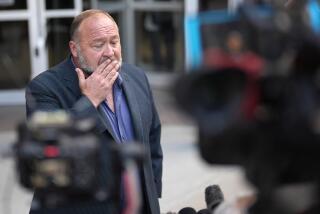Financial Woes Strike Texas Billionaires : Hunt Brothers, Others Caught in Cash Crunch
- Share via
DALLAS — Legend had it that H. L. Hunt, the renowned Texas oil wildcatter who left his children one of the nation’s great fortunes, was so frugal that he took his lunch to work in a brown paper bag. Frugality may again be in vogue at the Hunts’ headquarters.
The high-stakes wheeling and dealing of Hunt’s heirs appears to be catching up to this generation--some family members have a cash crunch and observers say one of America’s richest families may not be as wealthy as thought.
For the record:
12:00 a.m. Feb. 27, 1985 FOR THE RECORD
Los Angeles Times Wednesday February 27, 1985 Home Edition Business Part 4 Page 2 Column 3 Financial Desk 2 inches; 69 words Type of Material: Correction; Wire
The Associated Press, in a story that appeared Saturday in The Times, erroneously reported that eight banks filed involuntary bankruptcy proceedings against 17 companies controlled by brothers T. Cullen Davis and Ken Davis. The filing was against two companies--Kendavis Industries International Inc. and Kendavis Holding Co., the majority owner of 16 subsidiaries. Ken Davis mistakenly told reporters that the bankruptcy petitions were filed against 17 companies, his attorney said.
The Hunts aren’t alone in their problems. Two other famous Texas multimillionaires--T. Cullen Davis and Clint Murchison Jr.--found themselves in bankruptcy court this week.
“It seems to be a tough time for Texas millionaires, or rather a tough time for Texas billionaires,” said William E. Gibson, chief economist at RepublicBank Corp. here.
The falling price of oil, farmland and commodities have all taken a toll on the Hunts’ fortune.
“The downturn in energy business may have been the basic factor, plus, at the same time, these people got into real estate projects that seem to have downturned as well,” Gibson said Friday.
The Hunt family was stung earlier this month by a government order to pay more than $200 million in back taxes--an order the family contests.
Then, on Wednesday, Hunt International Resources Inc., a major holding company of brothers Nelson Bunker Hunt and W. Herbert Hunt, told the Securities and Exchange Commission that it is in default on $295 million and is unlikely to be able to repay it all.
The filing was an uncharacteristic twist to the often colorful saga of the Hunts, thought to be among the richest of American families.
When asked how much he was worth at a congressional hearing into the Hunt brothers’ purchase of 59 million ounces of silver, eccentric Nelson Bunker Hunt said: “A fellow asked me that once and I said I don’t know, but I do know that people who know how much they are worth generally aren’t worth very much.”
Herbert and Bunker Hunt lost an estimated $1.7 billion in the silver market crash of 1980. It wasn’t the first time the Hunts have lost big--Col. Moammar Khadafy of Libya nationalized Bunker’s oil operations in 1972.
But the Hunts, while always secretive about their holdings and operations, were thought to be able to absorb the previous shortfalls adequately.
Hunt International’s recent decline is thought to stem from a sharp fall in the price of commodities, including sugar and oil, which victimized the brothers.
The company is one of three Hunt operations that, along with Placid Oil Co. and Penrod Drilling Co., have seen the value of oil, gas and coal leases plunge. Bunker also has extensive farm and ranch land holdings and the value of that has also fallen.
While the declines have apparently forced the Hunts into a cash bind, the paper value of the family’s holdings still may be in the $3 billion to $4 billion range, according to a recent Wall Street Journal estimate, down perhaps $4 billion from the $7 billion to $8 billion net worth Herbert implied once in 1980.
“My guess is they’ll turn out to be very wealthy people at the end,” Gibson said. “But I really don’t know.”
Hunt spokesman Tom Whitaker said Friday that the family would not comment. In a statement last November, Herbert Hunt said “there have been short-term gains and losses among Hunt interests since 1980 . . . (but) the outlook for the businesses engaged in (is) very positive.”
On Thursday, the U.S. Bankruptcy Court in Dallas found itself handling filings concerning Davis, a Fort Worth industrialist with oil field equipment and servicing operations, and Murchison, son of a wildcatter and former owner of the Dallas Cowboys of the National Football League.
Eight banks forced companies controlled by Davis and his brother Ken into involuntary bankruptcy.
The banks, which claim that they are owed $319.6 million, filed proceedings in bankruptcy court against 17 companies that are part of Kendavis Industries Inc., a conglomerate owned primarily by Cullen and Ken Davis.
“I could not imagine that they would be dumb enough to do it,” Ken Davis, president of Kendavis, said of the banks’ action. “The story ought to be on the TV show ‘That’s Incredible.’ ”
In August, 1976, a masked gunman invaded Cullen Davis’ hilltop mansion, wounded his estranged wife, Priscilla, and a visitor and shot to death Priscilla’s 12-year-old daughter, Andrea Wilborn. Davis was later acquitted after a five-month trial.
In August, 1978, Davis was accused of paying an assassin $25,000 to kill the judge who presided over his divorce from Priscilla, and was again acquitted.
Clint Murchison’s career has been in far fewer headlines.
Murchison, who suffers from a degenerative disease, filed a request for protection from his creditors in federal court while he reorganizes his assets and draws up a plan for retiring more than $140 million in debts.
On Feb. 7, three creditors filed a petition with U.S. Bankruptcy Judge John C. Ford to force Murchison into involuntary bankruptcy.
More to Read
Sign up for Essential California
The most important California stories and recommendations in your inbox every morning.
You may occasionally receive promotional content from the Los Angeles Times.












